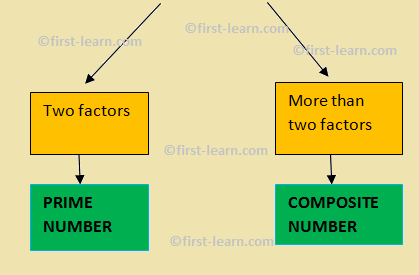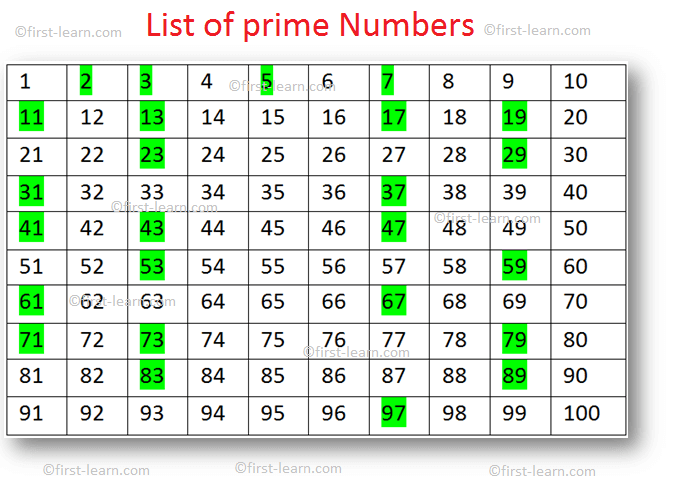Prime and Composite Numbers
Prime numbers are numbers that are divisible by one and itself or we can say that they have exactly two factors. These numbers only appear in the tables of 1 and the number itself. They do not appear in the table of other numbers.
Examples are: 2, 3, 5, 7, 11, and 13…… etc
Composite numbers are numbers that are not only divisible by one and itself but are divisible by other numbers as well or we can say they do not have exactly two factors but more number of factors. These numbers appear in the tables of various other numbers except one and the number itself.
Examples are: 4, 6, 8, 9, 12, 14, 16, and 18 ……….etc.
1 does not fall under the head of prime or composite number hence termed as co-prime number.
How can we find out whether a number is prime or composite?
Check the factors of the given number
There are two possibilities
Here is a list showing all the prime numbers
The numbers that are highlighted are prime numbers and the numbers that are not highlighted are called composite number.
1 is not highlighted but it is not a composite number it is a co-prime number as mentioned earlier.
One important thing to note from the grid of numbers given is that all the prime numbers are odd numbers except 2. That is why 2 is called the only even prime number as all other prime numbers are odd.
Examples of sum more prime numbers:
101, 103, 107, 109, 113, 127, 131, 137, 139, 149
Example:
Find the prime numbers from 50 to 60
|
Factors of 50 |
50 × 1 = 50 2 × 25 = 50 5 × 10 = 50 |
More than 2 factors; composite |
|
Factors of 51 |
51 × 1 = 51 3 × 17 = 51 |
More
than 2 factors; composite |
|
Factors of 52 |
52 × 1 = 52 26 × 2 = 52 13 × 4 = 52 |
More
than 2 factors; composite |
|
Factors of 53 |
53
× 1 = 53 |
2
factors; Prime |
|
Factors of 54 |
54 × 1=54 2 × 27 = 54 3 × 18 = 54 6 × 9 = 54 |
More
than 2 factors; composite |
|
Factors of 55 |
55 × 1 = 55 11 × 5 = 55 |
More
than 2 factors; composite |
|
Factors of 56 |
56 × 1 = 56 2 × 28 = 56 7 × 8 = 56 4 × 14 = 56 |
More
than 2 factors; composite |
|
Factors of 57 |
57 × 1 = 57 3 × 19 = 57 |
More
than 2 factors; composite |
|
Factors of 58 |
58 × 1 = 58 2 × 29 = 58 |
More than 2 factors; composite |
|
Factors of 59 |
59 × 1 = 59 |
2
factors ; Prime |
|
Factors of 60 |
60 × 1 = 60 6 × 10 = 60 2 × 30 = 60 3 × 20 = 60 4 × 15 = 60 12 × 5 = 60 |
More than 2 factors; composite |
From Various Types of Numbers to HOME PAGE
Recent Articles
-
Plants Around Us | Big & Small Plants | Shrubs & Herbs | Water Plants
Feb 03, 26 02:01 AM
We see different types of plants around us. Plants are living things. They breathe and grow. They also reproduce. Most of the plants grow on land. Some plants grow in water. -
Formed Elements of Blood | Erythrocytes | ESR |Leukocytes |Neutrophils
Jan 15, 26 01:25 AM
Formed elements formed elements are constitute about 45 % of blood afeias haematocrit value packed cell volume mostly of red blood corpuscles and are of 3 types- erythrocytes, leukocytes and blood pla… -
What Is Plasma? | Blood Plasma | Proteins | Nutrients | Cholesterol
Nov 07, 25 10:29 AM
Blood is a mobile fluid which is a connective tissue and is derived from the mesoderm like cell any other connective tissue. Colour of blood is reddish and that flows inside the blood vessels by means… -
Disorders of Respiratory System | Tuberculosis | Pleurisy | Emphysema
Oct 28, 25 11:39 PM
Tuberculosis is very common disease and is caused by a type of bacteria called Mycobacterium tuberculosis. This disease causes different trouble in the respiration and infection of several parts of th… -
Regulation of Respiration | Respiratory Centres | Inspiratory Area |
Oct 14, 25 12:13 AM
Respiratory Centre is the area that controls the rate of respiration and it is observed to be located in medulla oblongata and pons. Respiratory Centre has the following will dispersed components like…







New! Comments
Have your say about what you just read! Leave me a comment in the box below.